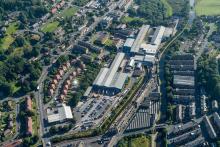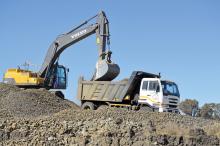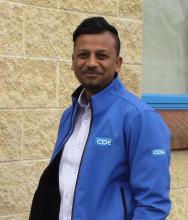
Following the acquisition of Trio by the Weir Group in 2014, Weir Minerals Africa has set Trio on a sustainable growth path that capitalises on Weir’s proven total solutions, a strong regional footprint and a successful business culture at large, writes Munesu Shoko.
One of the key resolutions was to engage directly with the market rather than via distributors. In southern Africa, the distributorship agreement with the previous supplier was terminated in April 2015, according to JD Singleton, general manager for Trio and Enduron products at Weir Minerals Africa. The company has since set up a highly experienced team to focus exclusively on its comminution solutions – from application and support engineers through to sales, aftermarket support and project management staff. With vast crushing and screening experience, the team will look after the Trio product range in Africa and the Middle East.
Singleton explains some of the major benefits when an original equipment manufacturer (OEM) goes direct to market. “At Weir Minerals Africa we are conscious of disintermediation and prefer to service our customers directly, thus strengthening relationships and building an intimate understanding of our customers’ operations over time. We believe that we can offer our customers better service and solutions because we know our product better than anyone else. We can leverage case studies and learnings from our installed base across the globe,” says Singleton. “Dealing directly with our customers also better informs our research and development (R&D) by incorporating the voice of the customer and their changing needs into our research projects.”
Singleton argues that doing business directly with end users also helps the OEM find quick solutions for its customers, especially in the current economic climate where uptime and productivity are key survival factors for both aggregate producers and mining companies.
Singleton maintains that the increasing market acceptance and installed base of Trio products is evidence of the success of this approach. The company boasts 19 sales and service centres in Africa which are strategically positioned to support its customers efficiently. “Weir Minerals Africa’s strong presence in mining regions on the continent and the Middle East is driving growth for our extensive Trio range of products. This is complemented by our significant investment into augmenting technical aftersales support and infrastructure in growth areas,” says Singleton. “Aggregate suppliers in the region are well aware of the prominent role that Weir Minerals Africa has played in the formal mining industry over the years, and they understand the value we are able to bring to their operations,” he adds. The company has built its reputation on strong technological performance and its value proposition of the lowest cost of ownership.
While the Trio brand leverages Weir’s existing mining footprint and track record for further growth in the region, Singleton observes that the aggregate market calls for a different approach to that of mining. “The aggregate market calls for faster turnaround times and flexibility, as much of the industry across Africa is driven by owner decisions,” says Singleton. “As opportunities arise, aggregate producers need to be responsive to capitalise on these. In turn, Weir Minerals is structured to deliver on these requirements, offering strong, flexible and innovative solutions.”
In terms of its customer base in the aggregate market, Singleton notes that smaller independent quarries are driving business in Africa and the Middle East at present. He notes that statistics show that in the aggregate market, the top 10 producers don’t even own 5% of aggregate plants in the world. “In South Africa and Africa at large, there are many smaller players in the quarrying industry, mostly owner-managed operations. So, this calls for customised solutions, per owner, per plant,” says Singleton.
The comminution team has been established specifically to service these individual owners in a responsive and flexible manner. While it is a seemingly complex approach given the extensive geography of the region, Singleton believes that talking directly to decision makers is favourable. “Projects at owner-managed quarries are progressed much faster from enquiry to execution than in mining, as a result of the owner-managed setup.”
Singleton also believes that the extensive Trio product range offers a distinct competitive advantage in that the customer has a one-stop solution. The comprehensive range extends from jaw crushers; cone crushers; apron-, grizzly-, pan- and belt feeders; vertical and horizontal shaft impact crushers; through to screens, washing equipment, conveyor belts and hoppers. “We can offer plants to produce from 50 to 1500 tonnes/hour. Our vast product range is a big advantage because it allows us to customise every single solution without sourcing any components from other suppliers,” says Singleton.
On-going investment in R&D means that the product offering is continually being improved and extended to meet customers’ requirements. The new Trio TP cone crushers were developed and launched onto the market by Weir within 18 months of the acquisition. “Weir’s extensive R&D capability facilitated the launch of the new Trio products within a very short space of time after the acquisition.”
Speaking of market conditions, Singleton says that demand for Trio products is good in both Africa and the Middle East on the back of favourable demand for construction materials in the region. “Infrastructure spend is always high in the Middle East, despite a slower economy in the region due to lower oil prices,” says Singleton.
There is also big infrastructure spend in West Africa, a region Singleton says is a key focus area for Weir Minerals Africa. He also sees East Africa as a significant growth area with countries such as Kenya, Ethiopia, Tanzania and Uganda enjoying higher GDP growth rates, complemented by big investments into infrastructure development. “East Africa is the fastest growing region on the continent with the most construction activity,” says Singleton.
Singleton reasons that growth in Central Africa has been slower as a result of lower copper prices and drought. “The mining downturn has hit the region hard, affecting investments into infrastructure development among others,” he says. Southern Africa is a region with more mature markets such as South Africa, Botswana and Namibia. Singleton says these are sustainable markets with a large installed base that supports the company’s aftermarket business. “We are actively engaged with customers in brownfields projects to upgrade existing plants to maximise production whilst lowering operating costs.”
Following good growth in 2015 and 2016, he is optimistic about 2017, especially given the direct approach to the market, a dedicated team, high stock levels and new, improved solutions for customers. “The first thing you do when you go direct to the market after many years of a distributorship model, is to inform the market about it as a crucial change. We believe that accessing the equipment directly from the OEM is very beneficial for the end user.”
Following increased enquiry levels in the second half of 2016, Singleton is particularly excited about prospects of growth for Weir’s comminution offering in 2017. “There is a direct relationship between enquiries and projects on the go. We are excited about the enquiries and the extensive project pipeline ahead of us,” says Singleton. “We expect a number of these projects to progress in the first quarter of 2017.”
Singleton believes that the positive vibe in the mining sector is very good for Africa’s construction sector, as much of the infrastructure development on the continent is driven by mining. “We are excited about what 2017 can potentially bring. We are ready to support our customers directly with customised solutions and quick parts and service support.”

